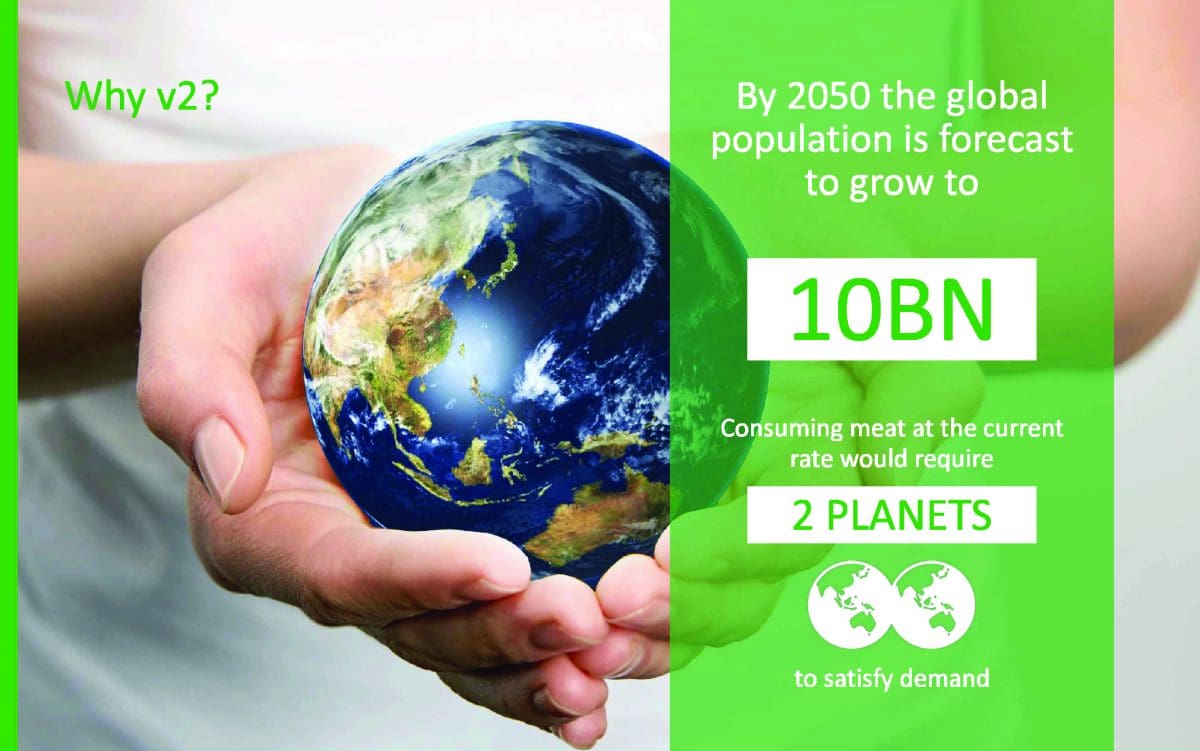
v2food CEO Nick Hazell addresses AGIC 2021.
THE plant-based alternative meat industry is targeting demand for protein that the animal meat industry cannot fill and, like its counter, is focussed on serving the domestic market but achieving its growth through export sales.
That was the message from v2food founder and chief executive officer Nick Hazell in his address to the Australian Grains Industry Conference (AGIC) 2021 in the Tuesday session entitled Consumer-driven trends and opportunities for Australian agriculture.
Launched nationally in 2019 on technology developed in collaboration with CSIRO, v2food has developed a range of plant-based foods, including patties for Hungry Jack’s Rebel Whoppers.
The growth in demand for its products was exemplified last year when v2food products went on sale in more than 1400 Australian supermarkets as COVID redirected its focus from food-service to retail.
In the past 12 months, v2food products have secured roughly half the market for plant-based proteins at Australia’s two supermarket majors, Coles and Woolworths, and Mr Hazell said export was now its focus.
“We are already 50/50 in terms of domestic and export but clearly, just like the meat industry in Australia, we are really focused on exporting,” Mr Hazell said.
“Our strategy, very simply, is to be number one in Australia so that we can export to the rest of the world.”
China the driver
While the adverse impact of China’s tariffs on Australian barley were mentioned in several sessions over AGIC’s two-day program, China’s ongoing demand for Australian agricultural exports is equally well documented.
In the grain space, it includes sorghum, where China has been Australia’s biggest customer by far for 2021-22 shipments to date, and wheat, with China the fourth-biggest bulk market in the six months to June.
In the eight months to August, China has also been the fourth-biggest export market for Australian beef.
Mr Hazell said China’s demand for v2food was part of its growing market for meat of all kinds.
“China, before the great growth of the last 30 years, was eating 10 kilograms of meat per person per year on average; now they eat 60kg of meat per person per year.
“If you look at where China’s going, Hong Kong eats 120kg of meat per person per year, which even beats Australia.
“That’s what happens when the Chinese get rich; they are getting richer.
“You do the maths on that sort of quantity times 1.4 billion and you do realise that this is a problem that has to get solved.
“Asia is where meat consumption is growing dramatically.
“This is a phenomenon which is not going away….because…population is growing globally, people are getting richer.”
Plant-based meat needed
Mr Hazell said the existing production model of growing feed for animals and then eating the animals was not going to be able to supply growing global demand for meat.
“If we consume meat at the current rate of increase, we run out of planet quickly.
“The good news is we can make meat more efficiently than we do from animals.”
Mr Hazell said v2food was well placed to help fill the void, and saw itself as being a partner with the animal meat industry.
“The meat industry has nothing to be afraid of from this phenomenon because the world is desperately short of meat, and is going to be desperately short of meat into the foreseeable future.”
He said markets would always exist for high-quality sustainably produced animal meat, but it could not supply growing global demand going forward.
“We just need to make so much more.”

A slide from v2food CEO Nick Hazell’s presentation at AGIC 2021.
Exports to Asia of v2food product started in November last year, the company moved into its own factory in Wodonga the following month, and v2food set up its China division in January.
By April, it had set up distributors in China, and v2food now employs 11 people in China.
“We are selling broadly into Asia.
“We are in a lot of the Burger Kings for example through Asia, but we want to be locally relevant.
“To do that we have set up a China team; we have got 11 people now in China.”
It includes an augmented product range including lines such as dumpling, a traditional pork-based staple.
“We have done major consumer work about what our brand should look like in China.
“We’re signing deals with some major players in China as we speak.
“We also have distribution deals in Japan, Korea, Singapore and Hong Kong.”
Starring role for soy
Australia has always had a soy deficit, and is a major importer of soybean meal for use in poultry and stockfeed.
Soybeans grown in Australia are largely absorbed by established customers in the human-consumption market, and v2food is therefore importing soy ingredients as a key component of its plant-based food.
Mr Hazell said v2food was looking at building a plant that could use 150,000t of Australian soybeans, and he said growing that much locally would be “absolutely doable…if the incentives are right”.
According to ABARES, Australia’s most recent soybean crop covered 24,000 hectares and yielded 40,000t.
Major soy production areas are in the Northern Rivers region of north-east New South Wales, and in Queensland.
“Our view is we should be contracting with Northern Rivers and Queensland growers.”
Soybeans are the base ingredient for v2food products, but Mr Hazell said the company was “open to other legumes” provided they passed the taste test.
“We want meat that doesn’t taste of plants; we don’t want it to taste beany.”
Net zero emissions goal
Sustainability was perhaps the most-discussed topic at AGIC 2021, and Mr Hazell said that needed to be a goal for Australia’s legume production.
“Part of our mission here is to reduce our carbon footprint; we think we can get to zero within four years, but it’s not going to happen without working with the farmers to sequester carbon in the soils.
“If we can sequester a couple of tonnes of carbon per hectare, we think we can get to a carbon footprint of zero.”
Mr Hazell said currently about 2.5 kilograms of carbon was generated for every kilogram of plant-based meat.
“There’s still a way to go to get to zero.”
He said 1kg of beef produced at least 20 times more carbon than plant-based meat.
“Pork and chicken are more efficient than beef, but still major efficiencies can be gained.
“It’s our belief that we can be one of the global players and that Australia can play a really, really big part in supplying meat to the rest of the world to basically ensure that good food doesn’t and shouldn’t cost the earth.”
Comfortable with labelling
The Senate Rural and Regional Affairs and Transport Legislation Committee is currently looking into the definitions of meat as used in branding, and submissions received include one from v2food.
It states that as a company, v2food is up-front about its products being plant-based, and this is made clear on packaging to consumers.
“There’s a lot of concern I think…particularly from the cattle industry, in using the word ‘meat’,” Mr Hazell said in a Q&A session following his address.
“I don’t think there’s a lot of evidence that there is a lot of confusion.
“From a consumer perspective, we’ve got to speak the language so they can find us and buy us.”
